RevOps reporting structure determines how effectively your revenue operations team can align marketing, sales, and customer success for company growth.
- Recognize the rapid rise of RevOps roles as businesses scale and prioritize revenue alignment.
- Address common confusion around the ideal reporting line for RevOps to maximize impact.
- Understand why this decision shapes cross-functional collaboration and overall business performance.
- Explore the most debated options and their implications for your organization.
Over the last few years, we’ve seen a massive increase in the number of RevOps professionals across the world. Considering how the business world has grown, this is not at all surprising. More and more companies are recognising the importance of a RevOps role and how it can help their company scale.
However, there are still a lot of questions that are floating around on the internet. One of the most hotly contested ones among them being ‘Who should RevOps report to?’
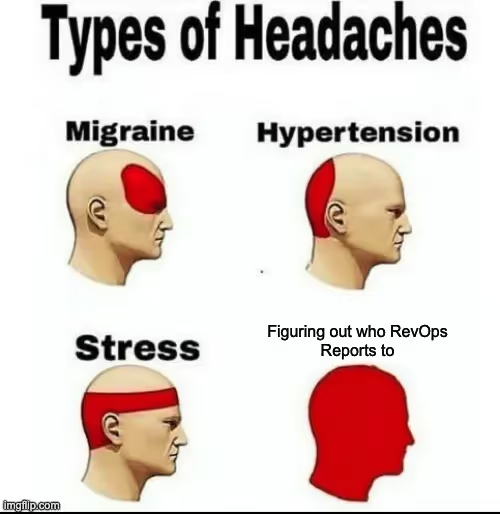
This question has been asked everywhere: On blogs, RevOps communities, and even LinkedIn posts. Everyone seems to have different answers and they all have strong opinions on why they’re right. Here are some of those opinions:

We’ll attempt to answer this raging question here. Before finding the right person RevOps should report to, you can brush up our earlier article here on “What does RevOps do?”
Now that you know what RevOps is, and what RevOps does, let’s take a look at all the possible roles that RevOps could report to.
RevOps reporting structures: A look at the possibilities
There are many different teams that RevOps could possibly report to. Let's take a look at each one of these possibilities and discuss each of them.
CMO: The CMO, or the Chief Marketing Officer is responsible for all marketing functions that the business undertakes. The goal of the CMO would be to get more high quality leads, through which sales can be made and revenue can be generated.
While technically the role of the CMO lends itself to revenue generation, the CMO only takes care of the pre-revenue funnel. One of the key functions of RevOps is to ensure that all GTM teams are functioning in tandem to meet the overall objectives of the business. Because of this, your RevOps team has to be working closely not only with the Marketing team, but also the Sales, Customer Success, and Finance team as well.
It is a reality of business today that sales teams and marketing teams are at loggerheads, especially when functioning as siloed teams. For RevOps to be effective, they’ll need to be able to collect real, ground-level sales data from the sales reps. Having the RevOps report the CMO then would mean that this data sharing might not always be easy, or accurate. This conflict of interest means that your RevOps team will be rendered ineffective.
Because of the above mentioned reasons, having the RevOps team report to the CMO would not be a great idea.

CFO: A lot of people are of the opinion that having the RevOps team report to the CFO is the right thing to do. After all, finance by nature is a strategic function, and the goal of the CFO would be to cut through all the noise and understand what is going on in the business in financial terms. This knowledge could play a key part in strategizing for the future.
However, this might not be the best reporting structure for your business.
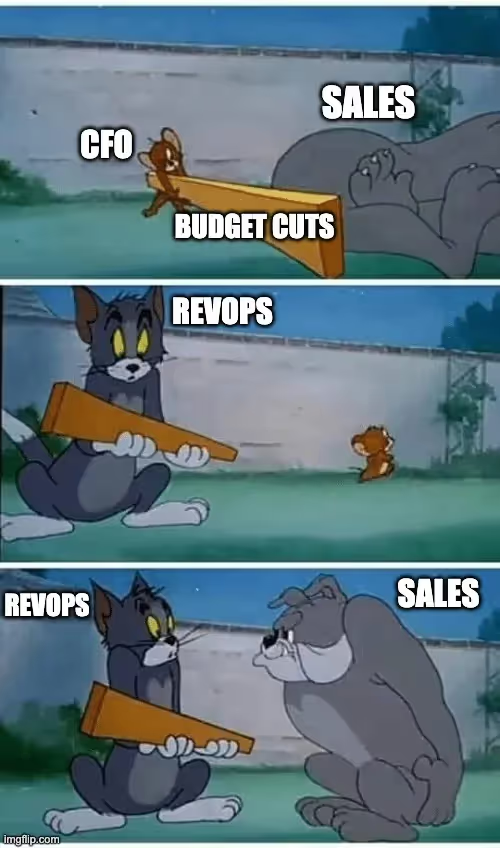
As mentioned earlier, the role of RevOps is to align all GTM teams and ensure that they’re all working towards a unified objective. GTM teams like Sales and Customer Success, which report to the CRO will then have to report data to a team that reports to the CFO. This roadblock means that the effectiveness of RevOps would largely be reduced, due to limited information sharing.
Even if we assume that the information sharing is not an issue, it’ll not be possible for the CFO to tell the CRO how the operations of the Sales or CS teams can be improved. This is the expertise of the CRO. We should also remember that due to the nature of the role, the CFO would look to be making budget cuts and improve efficiency of the team. Because of these budget cuts being a possibility, the CRO might not necessarily be open to scrutiny from the CFO as well.
Practically, having your RevOps team report to the CFO will cause a lot of challenges because of the different goals, and therefore this reporting structure is not recommended for most companies.
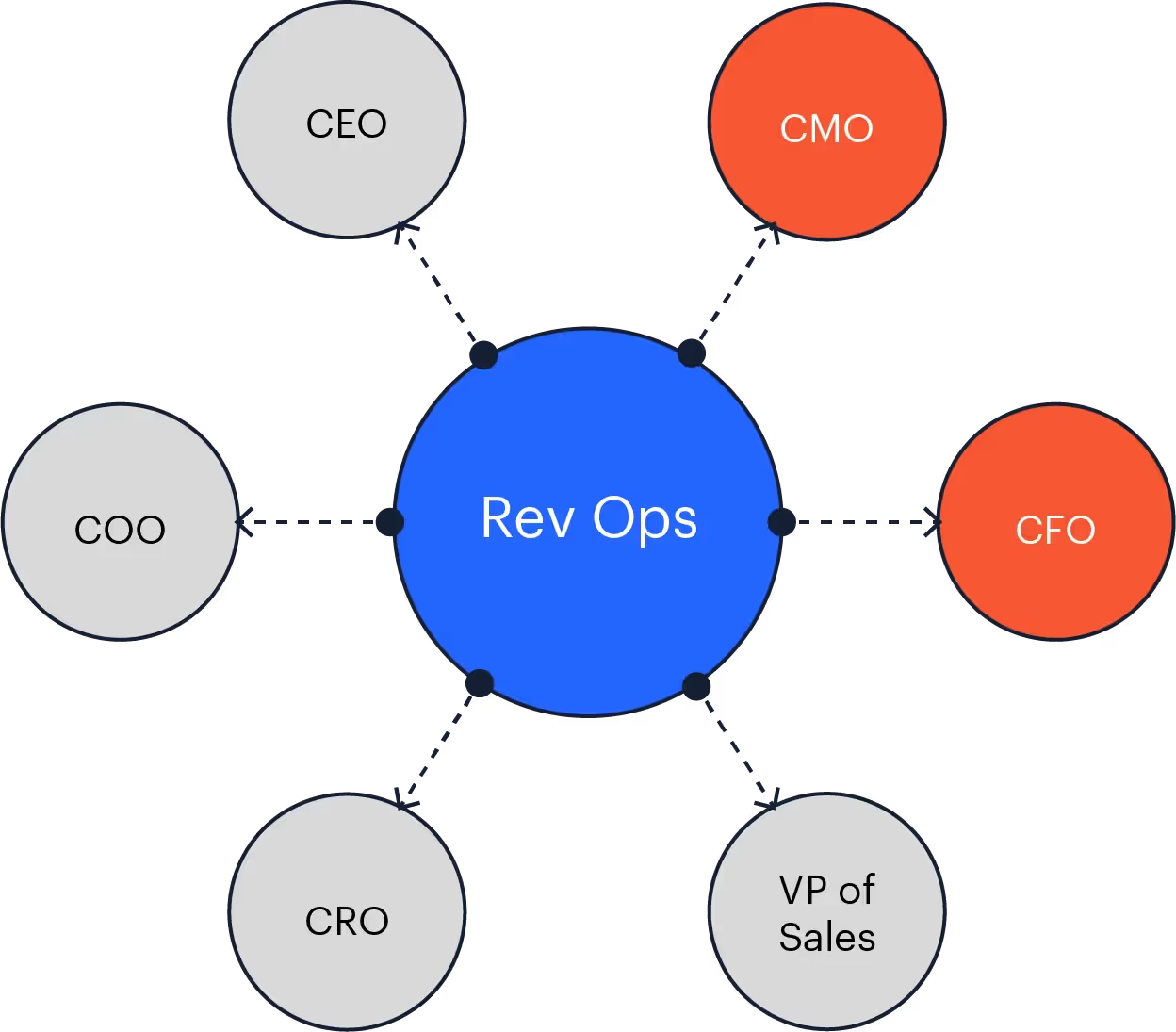
VP of Sales: In the initial stages of an organisation, there might not be a title called the CRO that companies operate with. There is usually a VP of Sales, who takes care of the entire revenue process in these companies. Can RevOps report to a VP of Sales?
Yes, but ONLY in the initial stages of the organisation, and also only if the VP of Sales takes care of the entire revenue process. As the company grows, the company will have multiple VP of Sales, each responsible for a different geographical area, and all reporting to the CRO. In these cases, it is better to have the RevOps as a separate team that reports directly to the CRO, instead of to a VP of Sales who then reports to the CRO. This will help avoid conflict of interest, and RevOps will be most effective in this reporting model.
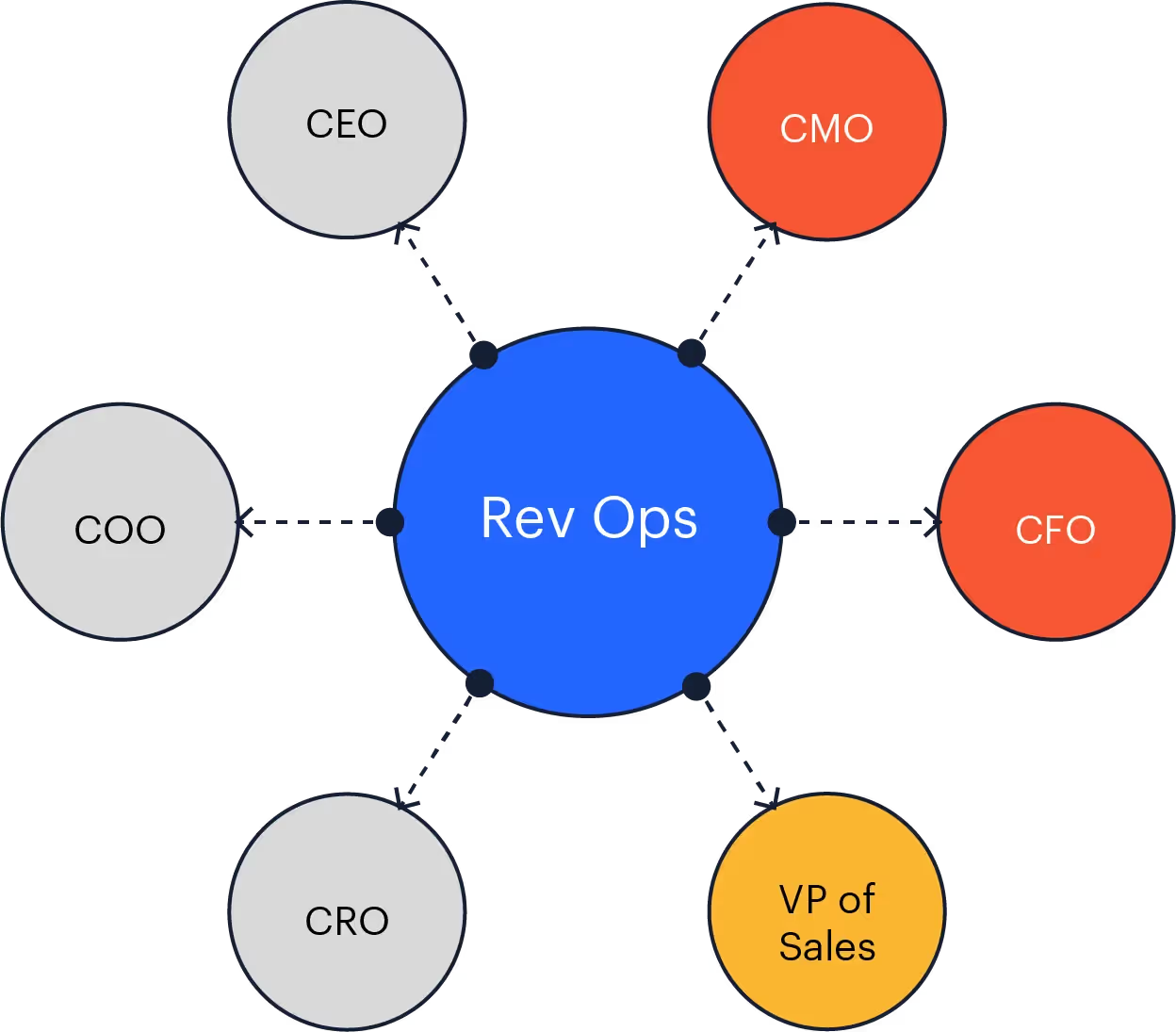
CRO: Of all the possibilities, reporting to the CRO would make the most sense for most businesses. Why? Because the CRO oversees all parts of revenue, from Marketing, to Sales, and Customer Success, and is responsible for the revenue process end to end.
Because your Marketing, Sales, and CS team all report to the CRO, having your RevOps team report to the CRO will be appropriate. RevOps can collect the necessary data from all the other departments and function as a right-hand man to the CRO.
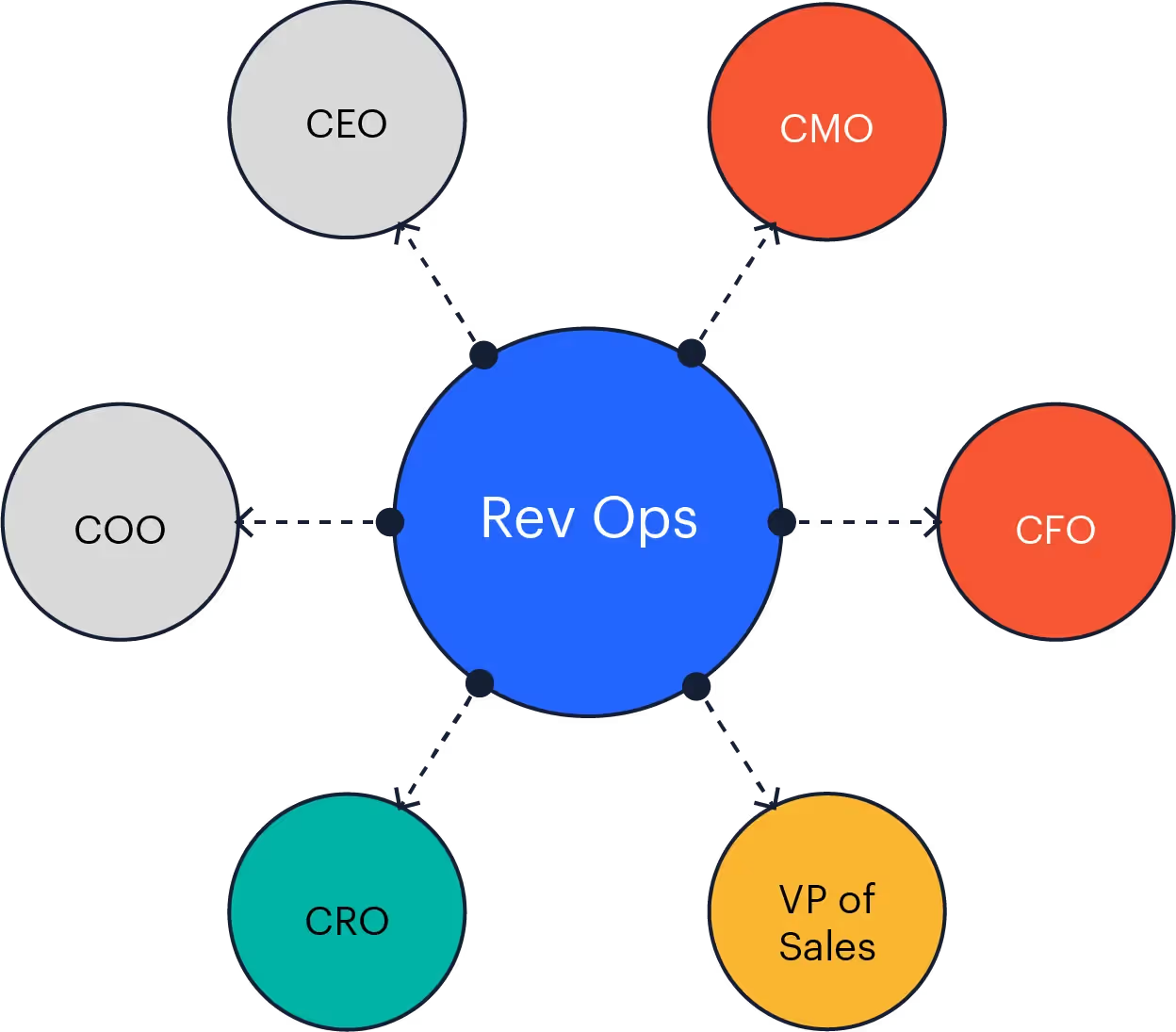
COO: Another possibility for your RevOps hire to report to could be the COO of your organisation. This is a role that is not in vogue of late, as the role of the CRO has been growing in recent years. However, if your company does have a COO, it would make sense for your RevOps team to report to the COO, provided that there is an alignment between the COO and the CRO.
This alignment is important since it is essential for RevOps to work with, or even report to the function that has the Sales team, as RevOps needs a lot of insights to be truly effective. These insights don’t come just from data, but from direct conversations with the ground level teams. That is why ensuring the alignment between the COO and CRO is important if your RevOps team is going to report to the COO.
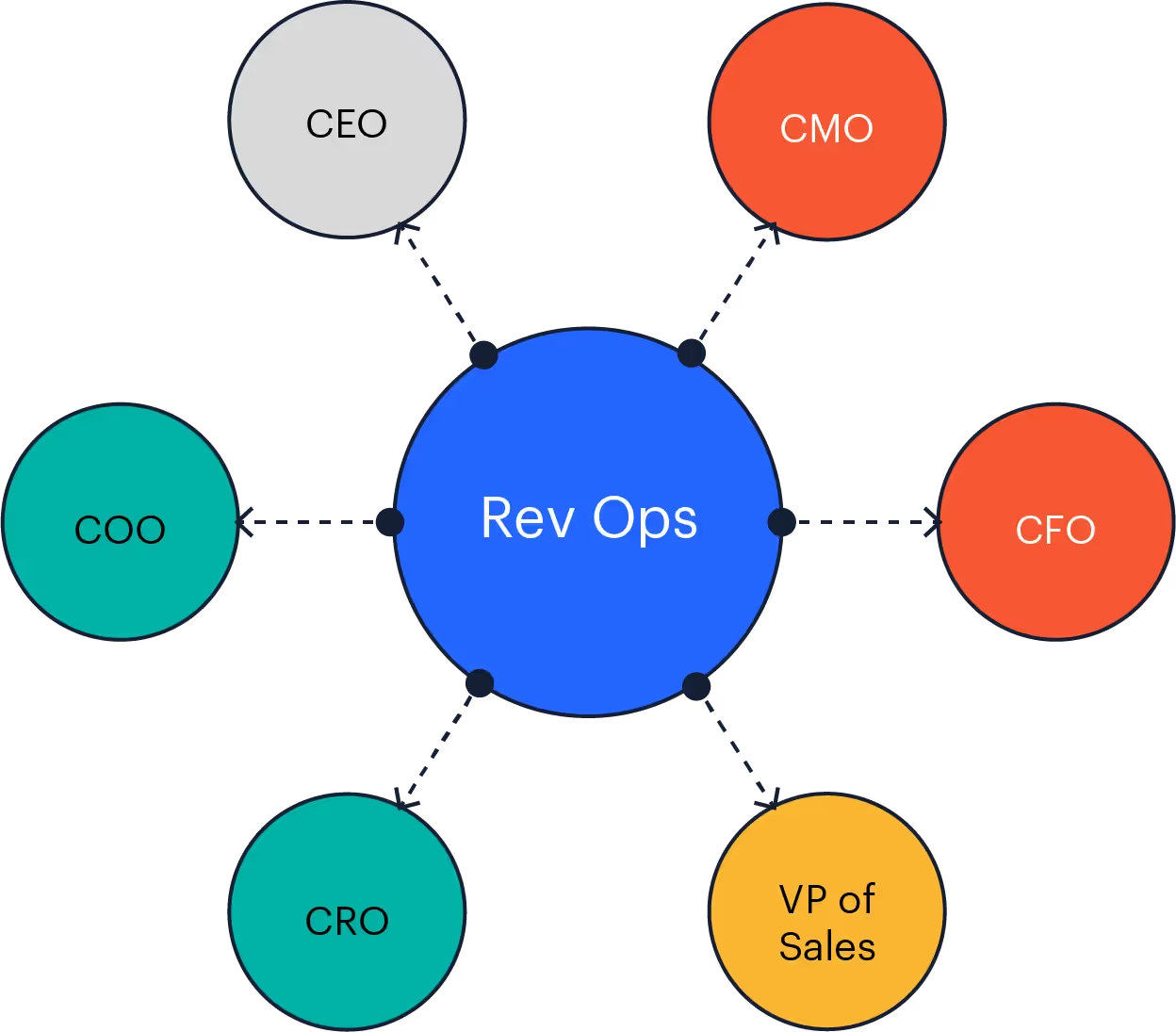
CEO: Another person that your RevOps team could potentially report to is the CEO of the company. Some companies may follow this reporting pattern in the initial stages of growth, but eventually, as the business grows, the CEO will have a lot more on his plate than just the revenue funnel of the company, which is what the RevOps team will be working on.
As the company grows, the CEO will have a bunch of teams working with him, each focusing on different specific areas. As these roles grow and develop, there will be a specific team that works on all aspects of the revenue funnel, possibly headed by the CRO. The RevOps team can focus on the revenue funnel, and report to the CRO, who will eventually report to the CEO.
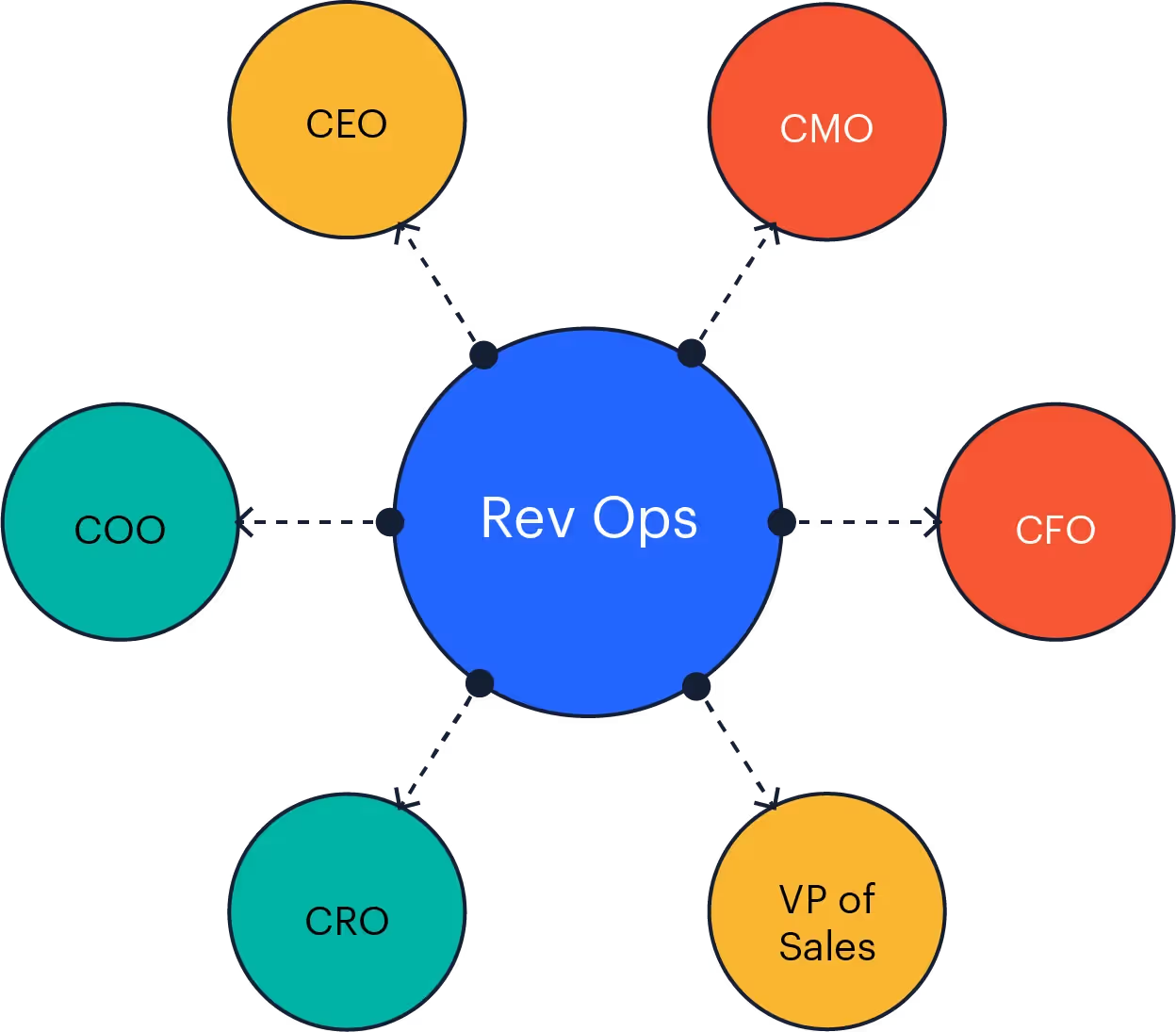
Now that we’ve looked at all the possibilities, let’s summarise our discussion. On an analysis of the various roles that the RevOps could report to, working with the CRO would make the most sense. This is because the CRO team would be focussing on the entire revenue funnel, and this is specifically the area that RevOps would most need to focus on. Reporting the COO would also make sense given that there is an alignment between the COO and the CRO.
Of course, like every hotly contested debate, you’re likely to find other opinions and points of view from different people. We’d love to know what you think! Also, don’t forget to subscribe to our blog for more articles like these!








%2520Quota-to-OTE%2520Ratio_.avif)



